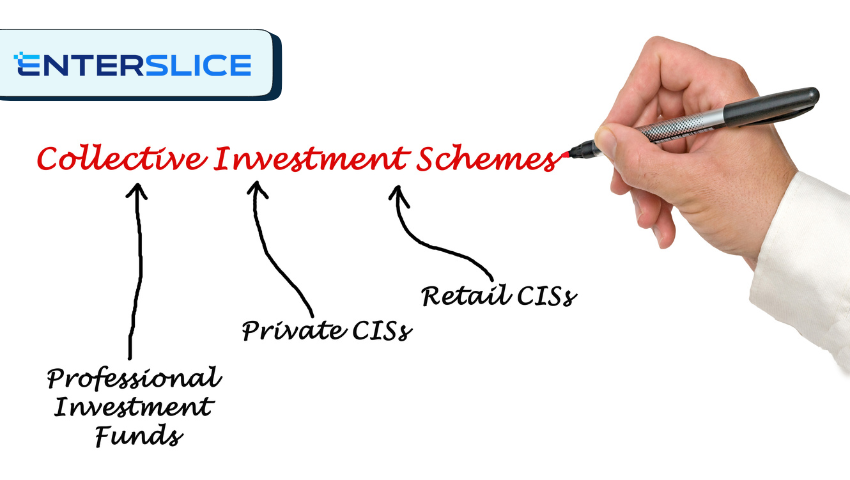When people think of investing, they usually picture mutual funds, stocks, or bonds. But there’s another interesting investment option that often goes unnoticed — Collective Investment Schemes (CIS). These schemes allow individuals to pool money into a shared fund, managed by a professional entity, to generate returns from common assets. While they can be profitable, not all CIS are safe or legal, making it crucial for investors to understand how they work and how to identify genuine ones.
What is a Collective Investment Scheme?
A Collective Investment Scheme in India refers to a financial arrangement where multiple investors contribute funds with a common objective — to earn profits or income from a shared pool of assets. The money is collectively managed by a registered entity, which invests it in ventures such as real estate, plantations, or other business opportunities.
The key feature of a CIS is collective benefit. Every investor shares the risks and rewards in proportion to their contribution. The idea is simple — instead of managing investments individually, people come together to leverage professional expertise and shared resources for better returns.
However, due to several fraudulent schemes in the past, the Securities and Exchange Board of India (SEBI) has laid out strict guidelines to regulate these schemes.
SEBI Regulations for Collective Investment Schemes
In India, SEBI is the primary authority responsible for regulating CIS under the SEBI (Collective Investment Schemes) Regulations, 1999. These regulations were introduced to ensure investor protection and prevent fraudulent activities.
Here are the key conditions defined by SEBI for any scheme to be classified as a CIS:
- The contributions must come from multiple investors.
- The funds are pooled together for a common purpose.
- Investors do not have day-to-day control over management or operations.
- The scheme’s income or returns are shared among investors in proportion to their investment.
Any company running such a scheme must register with SEBI as a Collective Investment Management Company (CIMC). Without registration, operating a CIS is considered illegal.
SEBI also mandates that the CIMC must have a minimum net worth of Rs. 5 crore and maintain transparency in operations. The company must appoint trustees and custodians to safeguard investor interests and ensure compliance.
Examples of Collective Investment Schemes
Common examples of CIS include real estate development funds, plantation schemes (such as teak or eucalyptus), and other pooled investment projects. In the past, some companies lured investors with unrealistic promises of high returns through agricultural or land-related schemes, leading SEBI to crack down on unregistered entities.
For instance, if a company invites the public to invest in a land development project where profits will be shared based on sales, it may be considered a CIS unless exempted by SEBI.
How to Identify a Genuine CIS
Given the history of scams in this sector, investors must exercise caution. Here are a few tips to identify genuine Collective Investment Schemes in India:
- Check SEBI Registration: Always verify whether the company is registered with SEBI as a Collective Investment Management Company. You can find this information on SEBI’s official website.
- Understand the Business Model: Avoid schemes that promise guaranteed or unusually high returns. Genuine schemes disclose risks transparently.
- Review Legal Documents: Check offer documents, trust deeds, and financial disclosures before investing.
- Avoid Unsolicited Offers: Be cautious of online or telephonic investment offers claiming quick profits.
Remember, if it sounds too good to be true, it probably is.
Benefits and Risks of Collective Investment Schemes
Like any other investment, CIS have both advantages and risks.
Benefits:
- Professional Management: Funds are managed by experienced professionals.
- Diversification: Collective pooling allows diversification across multiple assets.
- Accessibility: It enables small investors to participate in large-scale projects.
Risks:
- Regulatory Risk: Investing in unregistered schemes can result in loss of funds.
- Market Volatility: Returns depend on the underlying asset’s performance.
- Lack of Liquidity: Some CIS investments have long lock-in periods, making early withdrawal difficult.
SEBI’s Crackdown on Illegal Schemes
Over the years, SEBI has identified and taken action against several fraudulent entities operating without registration. Companies that raise money from the public without proper authorization can face heavy penalties and even prosecution.
To prevent such frauds, SEBI continuously updates its regulations and encourages investors to report suspicious schemes. The regulator’s strict supervision has significantly improved transparency and investor protection in the CIS segment.
The Future of Collective Investment Schemes in India
As India’s investment ecosystem matures, collective investment schemes are evolving too. With better technology, investor education, and regulatory oversight, the sector holds potential for growth — especially in areas like real estate and sustainable projects.
However, success will depend on maintaining transparency, trust, and compliance with SEBI’s guidelines. Investors, on their part, must remain informed and vigilant before investing.
Final Thoughts
Collective Investment Schemes in India can be a promising avenue for investors looking to diversify their portfolios beyond traditional instruments. But the key is to choose wisely. Always verify SEBI registration, understand the business model, and assess the risks before participating.
By staying informed and cautious, investors can make the most of legitimate CIS opportunities while avoiding potential pitfalls.
FAQs
1. What is the difference between a CIS and a mutual fund?
While both involve pooled investments, mutual funds primarily invest in securities like stocks and bonds, whereas CIS can include assets like real estate or plantations.
2. Can individuals start a Collective Investment Scheme?
No. Only companies registered with SEBI as Collective Investment Management Companies can operate CIS legally.
3. Are all real estate projects considered CIS?
Not necessarily. Only those where investors contribute funds collectively for profit-sharing fall under CIS regulations.
4. How can I verify if a scheme is SEBI-registered?
You can check SEBI’s official website under the “Collective Investment Schemes” section for the list of registered companies.
